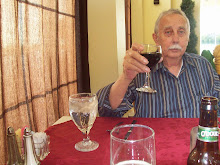In art, angels are depicted as beautiful women, sometimes men, with wings. Is this what they really look like? Many people are under the impression that angels are the souls of humans, especially those who are saintly. Is this true? Or a fallacy? It is said that Medieval scholars argued about how many angels could fit on the head of a pin. What's the answer? Does everyone have a guardian angel? Does anyone? Are there evil angels? Are Satan and demons fallen angels? What the heck are angels, anyway? I hope to answer these questions with this article. My source is the Catholic Encyclopedia at New Advent.
The word "angel" stems from the Greek and Latin words for messenger. Literally, an angel is a "heavenly messenger." According to the article in the Catholic Encyclopedia, angels are spiritual beings intermediate between God and men. They are God's attendants and messengers. They function as His assistants. In the Bible they are usually sent to earth to bring messages to mankind.
In Jacob's vision, they are depicted as ascending and descending the ladder which stretches from earth to heaven. This would seem to indicate that they do not fly and hence have no use for wings.
According to the article's interpretation of the Bible, it implies that each individual has its "tutelary angel." This may mean the same as a "guardian angel," but it seems that there is some dispute of whether each individual has a guardian angel. An angel may also intercede with God for a person. The angels may also aid God in administering the material world.
Apparently there is a hierarchy in heaven. Cherubim are God's ministers. There are also beings called Seraphim. There is a mystic seven who stand before God. And there are Archangels. Exactly where each fit into the hierarchy is not clear. St. Gregory the Great wrote a treatise on the hierarchy which you can read in the Catholic Encyclopedia.
How many angels are there? The closest we get to a number is the word "prodigious."
Yes, there are bad angels, and Satan is their leader. Also mentioned in the Catholic Encyclopedia article are Behemoth and Leviathan.
In the Book of Revelation of the Bible, angels play a major role in this prophesy of the End of Days. In my fantasy series, the Morgaine Chronicles, these angels appear in Morgaine at Armageddon, whose plot is very loosely based on passages in The Book of Revelation.


